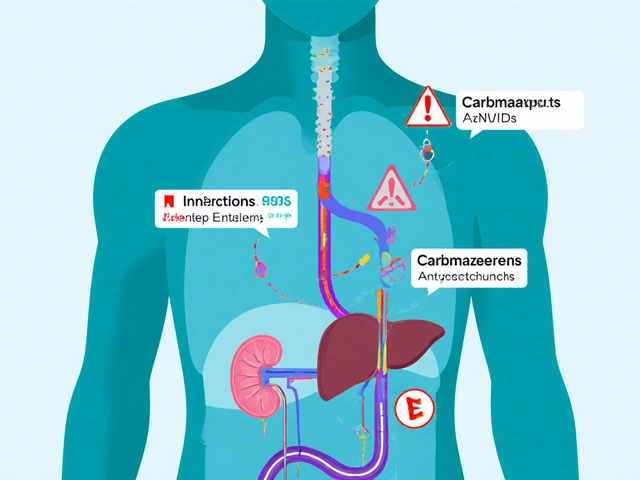You’ve probably heard someone casually mention popping an Ativan before a flight or stressful meeting, but there’s nothing casual about this tiny pill. Ativan, also known as lorazepam, often hides behind its reputation as just another anxiety medication. The reality? It’s so much more powerful—changing brains, behaviors, and even relationships. People reach for it when panic attacks hit hard, but few really understand what’s going on beneath the surface or how risky getting too comfortable with it can be. Ready for a no-nonsense look at Ativan? Let’s cut through the noise and talk straight about what this med really means for your mind and your life.
What Is Ativan And Why Do Doctors Prescribe It?
Ativan is the well-known brand name for lorazepam, a drug in the benzodiazepine family. It gets handed out mostly for anxiety—think sweaty palms, racing heart, and that creeping sense of doom that won’t let you sleep at night. Sometimes it’s given before surgery to calm your nerves, or to control certain seizures. But here’s the thing: Ativan doesn’t fix the cause of anxiety; it hits the brain’s brakes. The medication boosts the effects of a brain chemical called GABA, which basically slows your nerve signals down and makes you feel relaxed, almost instantly for some.
This drug is no rookie—it’s been around since the 1970s. Doctors still like it because it works fast, especially in stressful hospital situations. For example, Ativan is used in emergency rooms to stop severe seizures (status epilepticus) and even to control agitation in people who can’t calm down enough to get treated for other problems. It can also be used off-label for insomnia, and to help with alcohol withdrawal, making it surprisingly versatile. But that speed and power are a double-edged sword: the same traits that make Ativan a life-saver can also make it addictive, especially when people use it for weeks instead of days.
So, who’s actually getting prescribed Ativan? Stats show millions of Americans fill prescriptions for benzodiazepines every year, with lorazepam consistently near the top of the list. It’s not just anxious young adults—older people, especially women over 65, are some of the biggest users, even though they’re at higher risk for side effects like memory problems and falls. Knowing who gets Ativan—and why—can help you talk honestly with your doctor about better, safer options if you’re struggling with anxiety.
How Ativan Affects Your Brain and Body
One little pill, big changes. Ativan can calm your mind in twenty to thirty minutes, making it one of the fastest-acting anxiety meds out there. But slowing down your brain has plenty of side effects that can sneak up on you if you’re not paying attention. Ever had a drink or two, then done something you barely remember? Ativan can have a similar effect. It dulls not just anxiety, but also memory, reflexes, and even your breathing if you take too much.
Folks often notice the “hangover” the next day—maybe you feel tired, a little foggy, or slightly out of it, even after taking Ativan the night before. Older adults are especially sensitive to this. Studies show that seniors taking benzodiazepines like Ativan are nearly twice as likely to end up hospitalized after a fall. There’s more: long-term use, even at regular prescribed doses, can mess with brain function and memory. It’s not just about getting forgetful—a well-known study from Canada found regular benzo users were more likely to show symptoms of early dementia compared to non-users.
At higher doses, Ativan can cause dizziness, muscle weakness, blurred vision, slurred speech, and even breathing problems. If you mix Ativan with alcohol or other sedatives (like painkillers or sleep aids), you can wind up in real danger. The combo slows your system down so much it can actually stop your breathing. Emergency departments see this all the time—mixing meds is way riskier than most people think.
| Common Side Effects | How Often They Happen (%) |
|---|---|
| Drowsiness | 15-30 |
| Dizziness | 8-11 |
| Weakness | 4-6 |
| Confusion | 3-5 |
| Memory Issues | Up to 5 |
There are also nastier surprises with Ativan if you have certain medical issues, like sleep apnea, liver problems, or a history of substance abuse. And while Ativan feels like it’s working wonders in the short term, using it for more than a couple weeks can set you up for bigger issues—especially dependence and withdrawal.

Risks: Dependence, Tolerance, and Withdrawal
Ativan isn’t just calming—it’s sneaky. Your body can get used to it fast, sometimes after just a few weeks. Dependence means your brain starts to “expect” the drug and struggles to work right without it. Suddenly skipping your dose isn’t just uncomfortable—it can be dangerous. Withdrawal symptoms can range from rebound anxiety (worse than before you started), irritability, sweating, and insomnia to, in serious cases, seizures or hallucinations. Benzodiazepine withdrawal is nothing to take lightly, and it’s one of the main reasons doctors try to keep prescriptions for short-term use only.
Tolerance ramps up when you need a higher dose to get the same effect you used to with a lower dose. This is a warning sign that dependence could be developing, especially if you find yourself counting the hours to your next pill. What surprises a lot of people is just how uncomfortable coming off Ativan can be, even if you’re not abusing it. Real stories from people who tried to quit after months of steady use talk about anxiety so gripping it feels physical—racing heart, tingling hands, and chest tightness that makes you think you’re having a heart attack. And for some, that fear leads them straight back to the medicine cabinet.
You might have also heard about people using Ativan recreationally, looking for that dreamy, “floaty” feeling. It’s true—it can become a drug of abuse, especially on college campuses or music festivals. But even those using it exactly as prescribed run the risk of becoming addicted. That’s why doctors now warn you up front: don’t stop cold turkey, and don’t make Ativan your daily go-to for stress. There are much safer long-term ways to handle anxiety and sleep problems (think therapy, meditation, or non-habit forming meds).
- Tip: Always talk to your doctor if you think you’re building tolerance or need a higher dose. Don’t adjust or stop Lorazepam on your own.
- Tip: Be upfront about any history of substance use—this helps your doctor pick safer options.
- Tip: If you want to quit, taper off slowly under medical supervision to avoid withdrawal complications.
Should You Take Ativan? Real-World Tips and Safer Alternatives
Let’s get real—not every anxiety episode calls for a pill, and not every pill suits every person. Ativan is powerful, but it’s not the magic fix the commercials make it out to be. If your anxiety is more than occasional, long-term strategies usually work better. Cognitive behavioral therapy (CBT), mindfulness, regular exercise, and building a solid sleep routine have proof behind them. Did you know behavioral therapy can reduce anxiety symptoms as much as medication, but without the side effects? And the results stick around longer, too.
If you and your doctor decide Ativan is right for you, ask for the lowest possible dose, and use it for the shortest time you can. Keep it as a rescue option, not a daily solution. Write down when you take it, and watch for patterns—are you reaching for it more often? That’s a sign you may need extra support for your anxiety or a different treatment plan.
- Keep Ativan out of reach from others, especially teens and elderly family members—prescription sharing happens way too much in real life.
- Never mix Ativan with alcohol or sleeping pills unless a doctor specifically says it’s safe (which is rare).
- Be clear about every med and supplement you’re taking, since Ativan can interact with lots of drugs—from allergy meds to antidepressants.
Trying it for sleep? Quick tip: Fix your sleep hygiene first—no phones in bed, keep the room cool and dark, and set a regular bedtime. For panic attacks, keep a tracker of your symptoms; notice if triggers repeat. The more you understand your patterns, the more you can do to manage them without relying on pills.

Stories, Stats, and the Future of Ativan
The story of Ativan is complicated—millions have found real relief, but others feel trapped by dependence or side effects. In the U.S., benzodiazepine-related overdoses have increased alongside opioid deaths, often because people combine them without realizing the risk. One CDC report found that nearly 5,000 overdose deaths per year involve both opioids and benzos like Ativan. The government has since added stronger warnings to prescriptions, but the pills keep circulating.
Doctors today are more careful with these drugs than ever, and you should be too. Before starting Ativan, ask yourself: What am I really treating here? Is it daily, chronic anxiety, or a panic episode here and there? If you’re just super stressed from a new job or a breakup, other options could work better and safer. Talk honestly with your doctor—bring up your biggest fears and be open about what you want out of treatment.
Now and then, you’ll still see Ativan working wonders in the hospital—a patient waking up from a seizure, or calming down enough to finally get the care they need. But for day-in, day-out anxiety, most experts are moving toward safer plans. Medications like SSRIs, plus therapy, appear more often in the latest medical guidelines for a good reason—they’re less risky long-term. But if you need fast help, nothing matches ativan for speedy, temporary relief. Just make sure you’re the one in control, not the other way around.








Allison Marruffo May 29, 2025
Thanks for the thorough rundown on Ativan. It’s helpful to see both the benefits and the risks laid out clearly. If anyone is considering it, talking openly with a doctor about dosage and duration is essential. Staying informed can prevent the trap of dependence.
Ian Frith June 3, 2025
Reading this feels like peeling back the curtain on a silent puppeteer that pulls at our nerves. The speed at which lorazepam can calm a racing mind is almost theatrical, yet the unseen strings of tolerance tighten with each use. One might think of it as a fleeting rescue raft in a stormy sea, but the tide can soon turn against the very sailor who rows it. So weigh the drama of immediate relief against the long‑term script you may be signing.
Beauty & Nail Care dublin2 June 7, 2025
Yo fam, did u know they r putting tiny chips in Ativan that talk to the gov? 👀🧠 i swear they want us all zzzzzed up so we dont question the real agenda. lol cant even trust my own prescription rn!! 😂💊 #WakeUpSheeple
Oliver Harvey June 11, 2025
Oh great, another pill that makes you forget you ever existed. :)
Ben Poulson June 15, 2025
It is imperative to acknowledge that benzodiazepines, whilst efficacious in acute settings, possess a pharmacological profile necessitating judicious prescription. The evidence presented herein underscores the requisite for vigilant monitoring and patient education. Accordingly, clinicians should balance therapeutic benefit against potential adverse outcomes. A measured approach will safeguard patient welfare.
Raghav Narayan June 19, 2025
Ativan’s rapid onset of action can indeed be a lifesaver in acute anxiety or seizure scenarios, however the neuropharmacological mechanisms involve potentiation of the inhibitory neurotransmitter GABA, leading to widespread neuronal suppression. This suppression, while beneficial for acute symptom control, also interferes with normal synaptic plasticity, which over time may manifest as cognitive deficits, particularly in episodic memory formation. Moreover, the development of tolerance is a well‑documented phenomenon, whereby the same dose yields diminishing anxiolytic effects, prompting dose escalation. Dose escalation, in turn, raises the risk of dependence, a state in which the central nervous system adapts to the presence of the drug and exhibits withdrawal symptoms upon cessation. Withdrawal can range from mild insomnia and irritability to severe complications such as seizures, which may be life‑threatening if not medically supervised. The pharmacokinetics of lorazepam, characterised by a relatively long half‑life, contribute to accumulation in the body, especially in older adults with reduced hepatic clearance, thereby amplifying adverse effects like dizziness and falls. Clinical guidelines therefore recommend limiting Ativan use to short courses, typically no longer than two to four weeks, unless under specialist supervision. In the context of chronic anxiety disorders, alternative strategies such as selective serotonin reuptake inhibitors, cognitive‑behavioral therapy, and lifestyle modifications have shown comparable efficacy with a more favourable safety profile. It is also essential to consider drug‑drug interactions; concomitant use of other central nervous system depressants, particularly alcohol, can result in synergistic respiratory depression. Patient education should emphasize the importance of adhering to prescribed dosing schedules, avoiding abrupt discontinuation, and reporting any emergent side effects promptly. Finally, regular reassessment of the therapeutic necessity of Ativan can prevent unnecessary long‑term exposure and its associated risks.
Tara Phillips June 24, 2025
For anyone wrestling with the decision to start Ativan, remember that empowerment comes from knowledge and proactive health management. Seek the lowest effective dose, use it sparingly, and always involve your healthcare provider in any plan to taper. Your well‑being is worth the diligent effort.
Derrick Blount June 28, 2025
While, undeniably, the foregoing exposition articulates the pharmacodynamic intricacies of lorazepam, it, however, neglects to address, the sociocultural determinants, that invariably influence prescription patterns, patient compliance, and ultimately, the trajectory of dependence; moreover, the omission of longitudinal cohort data, which would elucidate real‑world outcomes, constitutes a methodological shortfall, one that, frankly, undermines the comprehensiveness of the argument.
Anna Graf July 2, 2025
Ativan is like a quick fix, but it can mess with your brain if you keep using it.
Jarrod Benson July 6, 2025
Hey, I get where you're coming from-sometimes you just need something fast to calm the nerves, and Ativan can do that, but think about the long run. If you keep leaning on it, you might find yourself stuck in a cycle where your brain starts to rely on that little pill to feel normal. That's why it's so important to pair any medication with other tools like breathing exercises, regular workouts, or even a quick chat with a therapist. Over time those habits can give you a steadier foundation, so you don't have to watch the clock for the next dose. Trust me, building that support network now pays off big later.
Liz . July 10, 2025
Honestly Ativan can help but also mess up sleep and memory just be careful
tom tatomi July 15, 2025
Well, if you think the risks are overstated, you’re obviously ignoring the countless ER cases where mixing benzos with booze ended badly. Just saying.
Tom Haymes July 19, 2025
It’s worthwhile to view Ativan as a tool rather than a crutch; when used responsibly under medical guidance, it can provide crucial short‑term relief while you implement longer‑term coping strategies.
Scott Kohler July 23, 2025
One must question the prevailing narrative that benignly portrays Ativan as merely a therapeutic aid, when in fact, the pharmaceutical conglomerates have orchestrated a covert campaign to normalize dependence, thereby ensuring a perpetual market for their product. This clandestine agenda, concealed behind layers of regulatory veneer, is manifest in the alarming rise of combined opioid‑benzodiazepine overdoses, a statistic that the mainstream media conspicuously neglects.
Brittany McGuigan July 27, 2025
America needs to stop lettin this foreign med dictover themself into our families, its a total risk for our Nation and we cant let it happen. we must protect our kids from these pills.
Priya Vadivel July 31, 2025
Thank you for sharing this perspective; it is, indeed, essential to remain vigilant, especially when considering the broader implications for public health, and I encourage open dialogue and continued research into safer anxiety‑management alternatives.